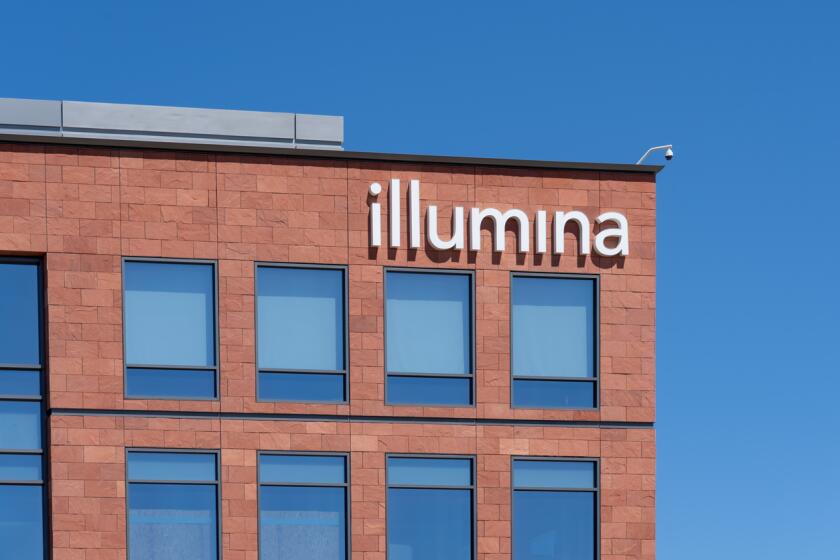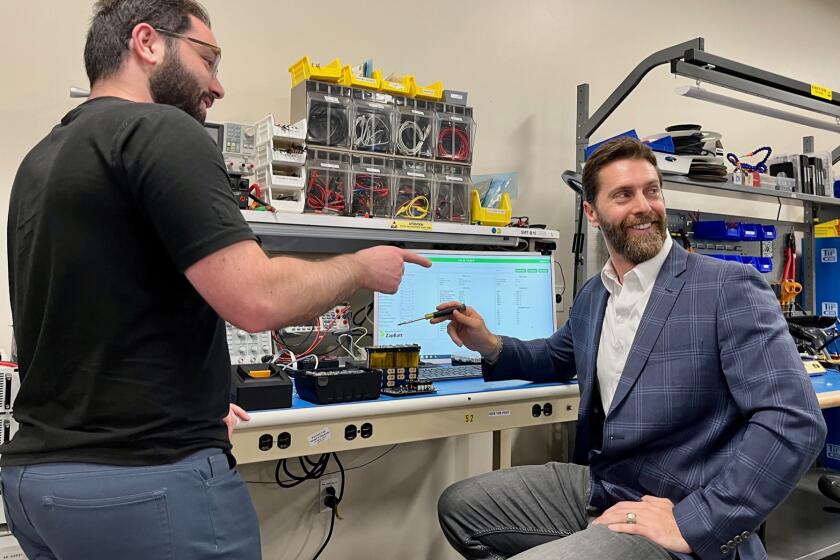Startup offers financing for stem cell therapy

San Diego company provides financing for top-dollar purchases
Instead of requiring clients to pay out of pocket for stem cell therapy treatments, thousands of doctors around the nation can now turn to a San Diego technology company to help patients finance the costly procedures.
The 2-year-old startup, named LoanHero, has built software brick-and-mortar businesses can use to help their customers secure a fixed-term loan when making purchases between $1,000 and $25,000. Founded in 2014, the company claims to have devised a way to give a larger pool of people — including those without stellar credit — financing options when making expensive offline purchases.
To do so, LoanHero works with a variety of different lenders, most of which can’t typically get access to consumers at the checkout counter. That includes community banks, credit unions and online-only subprime lenders.
“We go out and partner with the banks and lenders that already have the low interest rates, but don’t have technology to enter the merchant point of sale,” said Derek Barclay, co-founder and president of the 20-person LoanHero. “To enter merchant point of sale, merchants need certain things. They want instant credit decisions. They want a technology platform they can log in to. Credit unions don’t build technology like that.”
LoanHero is a lender, too, meaning the company can and will step in and do the financing itself on occasion. In fact, the startup has raised $20 million in debt funding, on top of its $4.2 million in equity funding, for that exact purpose, with plans to raise even more funds.
Now, the young upstart is venturing into mostly uncharted waters by extending its financing platform to orthopedic surgeons performing stem cell procedures, which typically cost between $2,500 and $5,000.
That’s because LoanHero has just cemented a national partnership with Matrix Biosurgical, which produces the treatments and works with thousands of orthopedic clinics. As a result, vetted surgeons can offer patients payment plans, with potentially better interest rates compared to credit cards (13.99 percent to 29.99 percent), that are underwritten by LoanHero. So, for people with pain and without the personal funds, that could mean the difference between opting for less-invasive stem cell injections and turning to their insurance companies to cover surgery.
“Stem cell therapy, historically, has not had finance options,” said Barclay. “There are mixed reviews on stem cell therapies. A lot of big banks won’t touch it ... and it’s not something covered by insurance.”
Beyond alternative medical care, the startup’s lending platform provides fixed-term financing for commonplace top-dollar concerns such as buying a couch, replacing the brakes on a car or getting cosmetic surgery.
Just two years in, LoanHero has financed around $25 million in loans. Currently, the upstart works with about 300 merchants and its financing options are available at more than 600 stores around the U.S. In San Diego, that includes auto repair company Ammco, laser hair removal business LaserAway and the tutoring program Sylan Learning Center.
“Merchants use our financing platform to offer affordable payment options to their customers,” Barclay said. “So when you go into a furniture store and there’s a dining set you want to buy for a couple thousand dollars, it might make sense to break that down over 24, 36 or 48 months rather than paying the full, upfront cost today using a credit card or cash.”
Terms vary, but a person who wants to finance a $5,000 bedroom set, and is determined to be of medium risk, for instance, might be offered a 48-month payment plan with an 18 percent interest rate, and no interest if paid in full during first 12 months.
Ultimately, LoanHero’s goal is to shake up the point-of-sale financing industry traditionally dominated by big banks and help retailers complete more sales. Ideally, shoppers too will benefit. They need only complete a single online application — one that considers more than just credit scores — and LoanHero will automatically and instantaneously sift through its database of lenders to spit out the best option for that customer.
The company’s custom approval formula considers a shoppers’ debt-to-income ratio along with historical data to estimate riskiness by merchant, industry and retailer.
By analyzing data beyond credit scores, LoanHero is pushing forward a financing trend favored by upstarts targeting youngsters without credit histories. Some 63 percent of millennials don’t have credit cards, according to a survey commissioned by Bankrate and compiled by Princeton Survey Research.
“Now there’s so much more information that can be found on prospective borrowers, and with that additional information, a lender can assess the creditworthiness of someone who doesn’t have all of the traditional info or someone who hasn’t been in their current job a long time,” said David Ely, associate dean at San Diego State University’s College of Business Administration.
“It is a reasonable argument to say that institutions can make good lending decisions for this broader population ... but it is somewhat unproven.”
A potential competitor to LoanHero, Affirm hails from PayPal creator Max Levchin and lends money to credit-less millennials on e-commerce sites. Like LoanHero, Affirm has developed its own scoring technology, sourced from public and private data, to determine a person’s creditworthiness on a purchase-by-purchase basis.
Perhaps the biggest difference between the two companies is that Affirm works with a single chartered bank, while LoanHero’s approach is to work with as many lenders as possible, particularly those in danger of being left behind by trends in consumer finance.
“I feel strongly about bringing in credit unions,” said Barclay. “Millennials are the last group to go to credit unions to get a loan and fill out paperwork. So the credit unions have to catch up.”
Get U-T Business in your inbox on Mondays
Get ready for your week with the week’s top business stories from San Diego and California, in your inbox Monday mornings.
You may occasionally receive promotional content from the San Diego Union-Tribune.












